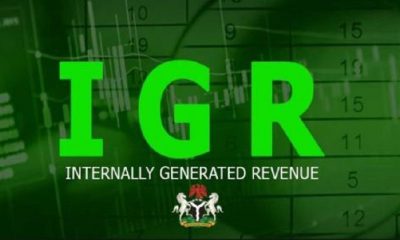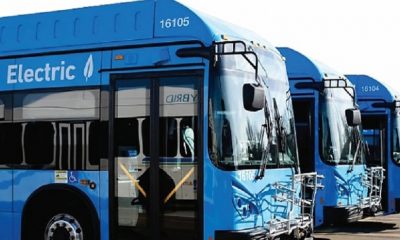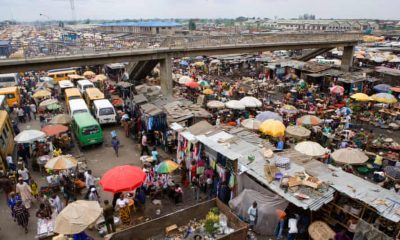General
Ambode To Construct More 288 Roads

By Dipo Olowookere
Governor Akinwunmi Ambode of Lagos State has asked local council bosses in the state to submit to him more 288 roads in their localities for construction.
This is coming barely 48 hours after Mr Ambode commissioned 114 newly constructed roads across the state.
The Governor on Tuesday warned residents to resist the temptation to convert any of the newly constructed roads to venue for commercial purposes or parking lot for abandoned vehicles.
Speaking through his representatives at the various locations, Mr Ambode said that conversion of the roads to other uses other than for motorists would reduce its life span.
At the commissioning of Seriki Kemberi Road and Alhaji Rasak Street in Iba LCDA, the Governor was represented by Mr Oladele Adekanye, a member of the Lagos State House of Assembly and Apostle Alexander Bamgbola, the President of the Christian Association of Nigeria (CAN), Lagos Chapter.
He lamented that some landlords in the state do not set aside space within their structures for parking, saying “rather, they ask their tenants to park on the road.
“Allowing heavy static load on the road will reduce the life span of the road. Good roads embellish the community. It would reduce flooding and residents would be able to live comfortably.”
Likewise, at the commissioning of Ojediran Shopitan and Taiwo Molajo streets both in Ikorodu West LCDA, Governor Ambode said illegal breaking of roads, usage as automobile workshop, as well as refuse dump, must stop henceforth on the new roads.
The Governor, who was represented by Asiwaju Olorunfunmi Bashorun at the commissioning of Ojediran Shopitan Street, noted that his government would not relent on its promise of an all inclusive government, boosting economic activities in the state, as well as guaranteeing safety of lives and properties of residents.
At Taiwo Molajo Street, member of the House of Assembly, Hon Abiodun Tobun who represented the Governor, urged residents to protect public utilities in their neighbourhood.
In Igando/Ikotun LCDA, the governor represented by Oba Onilado of Ilado, HRH Oba Mobadenle Oyekan, handed over newly constructed Osunba Street, near the Igando market in Alimosho area of the state.
Also commissioned in Igando/Ikotun LCDA by the Governor, represented by Oba Lasisi Gbadamosi of Igando, was Balogun Olanrewaju Road in Central Igando.
Sole Administrator of Igando/Ikotun LCDA, Mr Samuel Ajayi at the event, revealed that Governor Ambode had directed the 57 councils to submit 288 additional roads (four from each council) for construction consideration from 2017.
Mr Ajayi confirmed the receipt of a directive from Governor Ambode to submit four new roads for construction, a development he described as unprecedented in the history of Lagos.
At the commissioning of Apa Palace Road and Kweme Road both in Badagry West LCDA, Governor Ambode urged all stakeholders in the communities across the State to cultivate the habit of timely reportage of suspicious movement around them to security agencies to nip in the bud any potential security situation.
He said there was great need for community leaders to assist security agencies to address the menace of cultism, kidnapping, miscreants, vandalism and hoodlums by providing timely information.
Speaking through the Alapa of Apa Kingdom, HRM Oba Oyekan Adekanmi Ajose and a member of the Lagos State House of Assembly representing Badagry Constituency I, Mr Olanrewaju Layode, Governor Ambode said the 114 roads initiative was in fulfilment of the social pact which he signed with the people during the electioneering and his inaugural speech of running a system in which the “greatest good shall reach the greater majority of the people.”
In Eti-Osa Local Government Area, the Governor who was represented by his Special Adviser on Sports, Mr Deji Tinubu, commissioned Ologolo Road, while Hon. Tajudeen Olusi did likewise at the Oba Elegushi Road, Ilasan.
Commissioner for Local Government and Community Affairs, Hon. Muslim Folami who represented Governor Ambode at the commissioning of Oribanwa to Lakowe Link Road in Ibeju Lekki Local Government said the 114 roads was a phenomenal achievement in the history of Lagos State.
At the handover of Iberekodo Road in Eleko, also in Ibeju Lekki, Governor Ambode who spoke through a member of the House of Representatives, Hon. Abdulkabir Aiyeola urged residents to ensure that the infrastructure stands the test of time.
Deputy Speaker of the House of Assembly, Hon. Wasiu Eshinlokun and Chairman, Health Service Commission, Dr. Bayo Adeniyi who both represented Governor Ambode at the commissioning of Thomas Street and Evans Street, both in Lagos Island East Local Government respectively said the roads more roads in the area would be given a facelift next year.
Governor Ambode also inaugurated Coker/Lafenwa Street and Ifoshi/Fadu Street in Ejigbo LCDA, and was represented by Professor Tunde Samuel, a former Special Adviser on Education and Kehinde Bamigbetan, his Special Adviser on Communities and Communication.
Similarly, the Governor also commissioned Balogun Street, Kuje and Dillion Street, both in Oriade LCDA and Omoalade Alafia and Oloruntoyin/Jebina Streets in Bariga Local Government, where he was represented by Alhaja Ali Ogundeji, Chairman, Ojo Community Development Council, Commissioner for Finance, Dr. Mustapha Akinkunmi, member House of Assembly, Hon. Rotimi Abiru and Mr Sanya Ajayi respectively.
General
Nigerian Bottling Company Bridges Education, Employability Gap

By Modupe Gbadeyanka
The Nigerian Bottling Company (NBC) has reaffirmed its determination to bridge the gap between education and employability in the country by sustaining its flagship Youth Empowered (YE) programme.
This initiative provides hands-on learning, real-world insights, and access to career-shaping opportunities to young Nigerians.
The 2026 edition of the scheme commenced on February 2 at the University of Lagos (UNILAG), with participants mainly young people between the ages of 16 and 35.
A statement from the organisation said this year’s rollout will expand to more tertiary institutions, including the Federal University of Technology, Akure (FUTA). This follows a successful 2025 tour that reached seven cities across the country, including Makurdi, Jos, Benin, Kaduna, Asaba, Akure, and Port Harcourt.
Participants in the 2026 programme will receive training across key modules designed to support personal, professional, and business growth, including Business Life Skills, Adaptability and Resilience, Financial Literacy, Customer Service and Communication, Sales and Negotiation Skills, and Workplace Ethics.
The sessions will also feature breakout workshops on Business Planning, Project Management, and Time Management, alongside the Director’s Grant Pitch Competition, where participants can pitch their ideas for a chance to win business funding.
In addition to skills development, NBC’s People and Culture team will be present throughout the programme to identify outstanding talent for future opportunities within the organisation, further strengthening the connection between learning, employment, and long-term career growth.
One of the participants at the UNILAG training, Waliat Adedogun, who received a cash grant through the Director’s Grant Pitch Competition to support her small business, said: “Youth Empowered gave me more than training; it gave me clarity and confidence. Winning the grant means I can finally take my business idea from a dream into something real. I now feel prepared to build, grow, and create opportunities not just for myself, but for others too.”
Since its launch in 2017, the scheme has impacted more than 70,000 young Nigerians, equipping participants with practical skills, confidence, and exposure needed to succeed in today’s dynamic workplace and entrepreneurial landscape.
This year’s programme is being delivered in collaboration with Fate Foundation as the implementing partner, with funding support from The Coca-Cola HBC Foundation.
Last year, 10 beneficiaries were selected for six-month paid internships across NBC locations in Lagos, Ibadan, Asejire, and Challawa, gaining direct industry exposure.
Additionally, three outstanding participants received sponsorship for an all-expenses-paid intensive culinary training programme and were awarded N1 million each to support the launch of their businesses.
General
INEC Fixes February 20 for 2027 Presidential, NASS Elections

By Modupe Gbadeyanka
The 2027 presidential and National Assembly elections will take place on Saturday, February 20, the Independent National Electoral Commission (INEC) has revealed.
In a notice for the 2027 general polls issued on Friday, the electoral umpire also disclosed that the governorship and state assembly elections for next year would be on Saturday, March 6.
Speaking at a news briefing in Abuja today, the chairman of INEC, Mr Joash Amupitan, expressed the readiness of the commission to conduct the polls next year, which is 12 months away.
The timetable issued by the organisation for the polls comes when the federal parliament has yet to transmit the amended electoral bill to President Bola Tinubu for assent.
This week, the Senate passed the electoral bill, reducing the notice of elections from 360 days to 180 days, while the transmission of results was mandated with a proviso.
Recall that on February 4, INEC said it was ready to go ahead with preparations for the elections despite the delay in the passage of the amended electoral law of 2022.
General
NGIC Pipeline Network to Experience 4-Day Gas Supply Shortage

By Modupe Gbadeyanka
The pipeline network of the NNPC Gas Infrastructure Company Limited (NGIC) will witness a temporary reduction in gas supply for four days.
This information was revealed by the Chief Corporate Communications Officer of the Nigerian National Petroleum Company (NNPC) Limited, Mr Andy Odeh, in a statement on Thursday night.
A key supplier of gas into the NGIC pipeline network is Seplat Energy Plc, a joint venture partner of the state-owned oil agency.
It was disclosed that the facility would undergo routine maintenance from Thursday. February 12 to Sunday, February 15, 2026.
The NNPC stated that, “This planned activity forms part of standard industry safety and asset integrity protocols designed to ensure the continued reliability, efficiency, and safe operation of critical gas infrastructure.”
“Periodic maintenance of this nature is essential to sustain optimal system performance, strengthen operational resilience, and minimise the risk of unplanned outages,” it added.
“During the four-day maintenance period, there will be a temporary reduction in gas supply into the NGIC pipeline network. As a result, some power generation companies reliant on this supply may experience reduced gas availability, which could modestly impact electricity generation levels within the timeframe.
“NNPC Ltd and Seplat Energy are working closely to ensure that the maintenance is executed safely and completed as scheduled. In parallel, NNPC Gas Marketing Limited (NGML) is engaging alternative gas suppliers to mitigate anticipated supply gaps and maintain stability across the network,” the statement further said.
“Upon completion of the maintenance exercise, full gas supply into the NGIC system is expected to resume promptly, enabling affected power generation companies to return to normal operations,” it concluded.
-

 Feature/OPED6 years ago
Feature/OPED6 years agoDavos was Different this year
-
Travel/Tourism10 years ago
Lagos Seals Western Lodge Hotel In Ikorodu
-

 Showbiz3 years ago
Showbiz3 years agoEstranged Lover Releases Videos of Empress Njamah Bathing
-

 Banking8 years ago
Banking8 years agoSort Codes of GTBank Branches in Nigeria
-

 Economy3 years ago
Economy3 years agoSubsidy Removal: CNG at N130 Per Litre Cheaper Than Petrol—IPMAN
-

 Banking3 years ago
Banking3 years agoSort Codes of UBA Branches in Nigeria
-

 Banking3 years ago
Banking3 years agoFirst Bank Announces Planned Downtime
-

 Sports3 years ago
Sports3 years agoHighest Paid Nigerian Footballer – How Much Do Nigerian Footballers Earn























